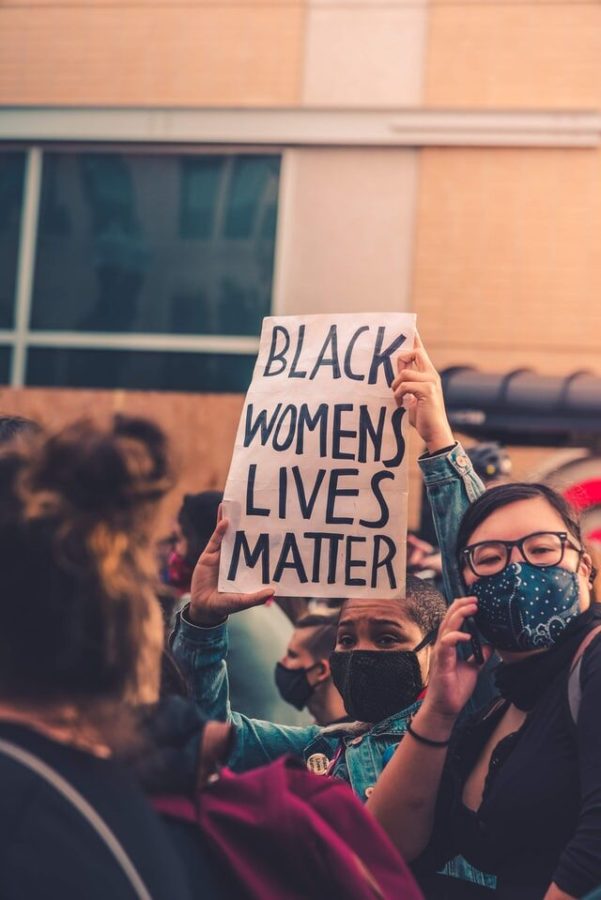Featured journalist Eddy Binford-Ross shares her experiences reporting protests in Portland
Following the deaths of Breonna Taylor, George Floyd and many others, protests for the Black Lives Matter movement have happened all over the world, specifically protests fighting for Black womxn.
October 20, 2020
During a live discussion hosted by Ames Public Library, 17-year-old student journalist Eddy Binford-Ross talked about the dangers of covering a protest.
Binford-Ross works for the Oregon Legislature and is the editor-in-chief of her high school newspaper the Clypian. Throughout the summer, Binford-Ross reported on over 30 Black Lives Matter protests across Salem and Portland, Oregon.
She documented the unprecedented use of federal officers in Portland and protests in her hometown Salem and went to Portland nightly to report on the events taking place on the streets.
“Someone had to step up and do it, so why not me?” Binford-Ross said.
Binford-Ross was part of a lawsuit against the federal government for the treatment of journalists during this time. She spoke on channels such as MSNBC about Portland, and her videos have been used by mainstream organizations such as ABC, CBS and The Washington Post.
She described the events that took place in her hometown as “unlike anything Salem has ever seen.”
Salem police officers were using tear gas; she said this was the first time they have ever used it. Officers shot people with less-lethal munitions for crowd control during the protests. Binford-Ross talked about how when federal agents arrived in Portland, she reported almost every night for two weeks on the federal occupation of the city.
“It’s very important that we chronicle this moment in history because it is a pivotal moment and a lot of change is going to come from it, in a good way,” Binford-Ross said. “It’s important that I provide an accurate account of events for the community.”
Binford-Ross her first night at the protests in Salem, the tear gas the police used was nothing compared to the tear gas the federal agents used in Portland. She said many federal agents were dressed in civilian clothing and would go around taking protesters into unmarked vehicles.
“We had flashbangs shot right at us, and then we were running away from the federal agents and the crowd through the park, and we had a federal agent shoot a tear gas canister right into our path,” Binford-Ross said. “I couldn’t see because my eyes were burning, I couldn’t breathe because my throat was burning. I almost threw up because I was coughing so hard.”
Binford-Ross was shoved into a wall by police riot control, even when her hands were up in the air, and said her experiences just brushed the surface compared to some of the protesters she witnessed. This is what ultimately led to the lawsuit against the federal government.
“It was really concerning to see how aggressive law enforcement was against journalists; they either didn’t care that you were a journalist or they were directly targeting you,” Binford-Ross said.
When asked about her experiences in correlation with white privilege, Binford-Ross described the Portland crowd control as being aggressive toward anyone and everyone protesting.
One example where privilege played a prevalent role in Salem was when alt-right protestors were holding a rally and then some Black Lives Matter protesters had a sit-in to protest the rally.
Binford-Ross said there was yelling, and at multiple times, fights broke out, both prompted by the alt-right protesters, and the victims were overwhelmingly Black community members.
“Alt-right protestors continuously assaulted Black community members during the protests as the police force did barely anything to stop them,” Binford-Ross said.
Every few years, there is a conflict between far-right and far-left activists in Portland, Binford-Ross said, but nothing to the extent she experienced. Portland is known as a liberal city, with the majority being whites. In the state of Oregon, citizens are allowed to open carry, so it was common for people to walk around with assault rifles, Binford-Ross said.
“Trump sent in federal agents to protect the courthouse, but before the feds arrived … the courthouse wasn’t even a central fixture in the protests; there was lots of graffiti, but the attention of the protesters wasn’t on the federal courthouse until Trump deployed federal agents to protect it,” Binford-Ross said. “It was very authoritarian of him to make a call like that. You see these types of actions taken in authoritarian dictatorships.”







